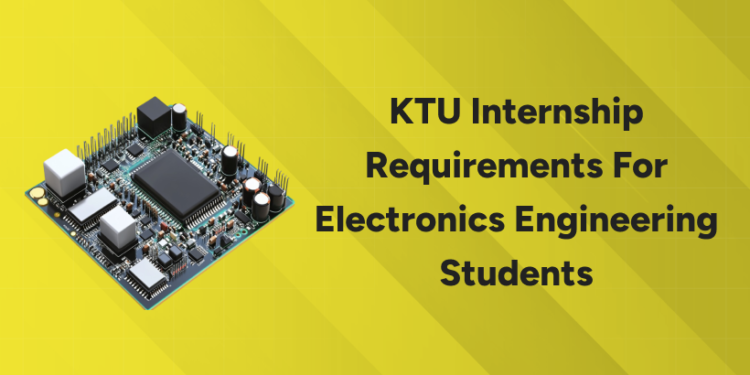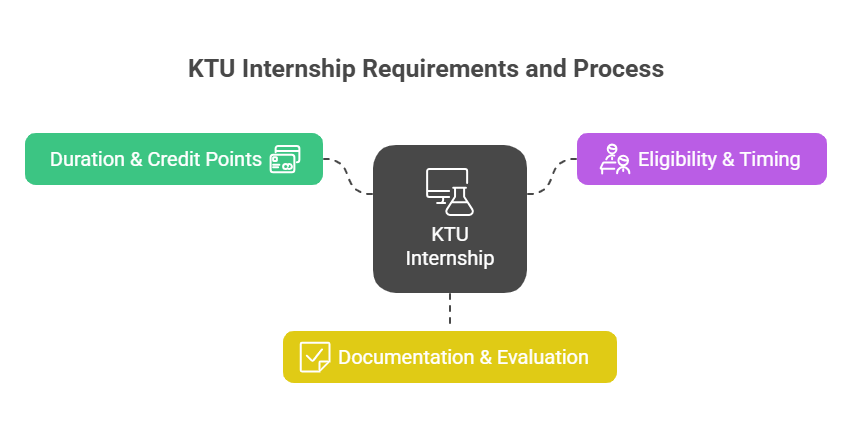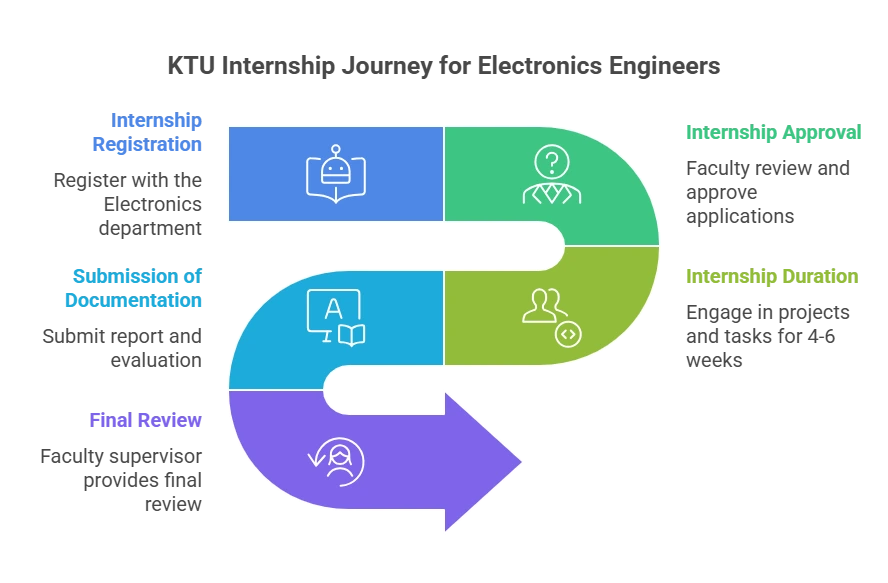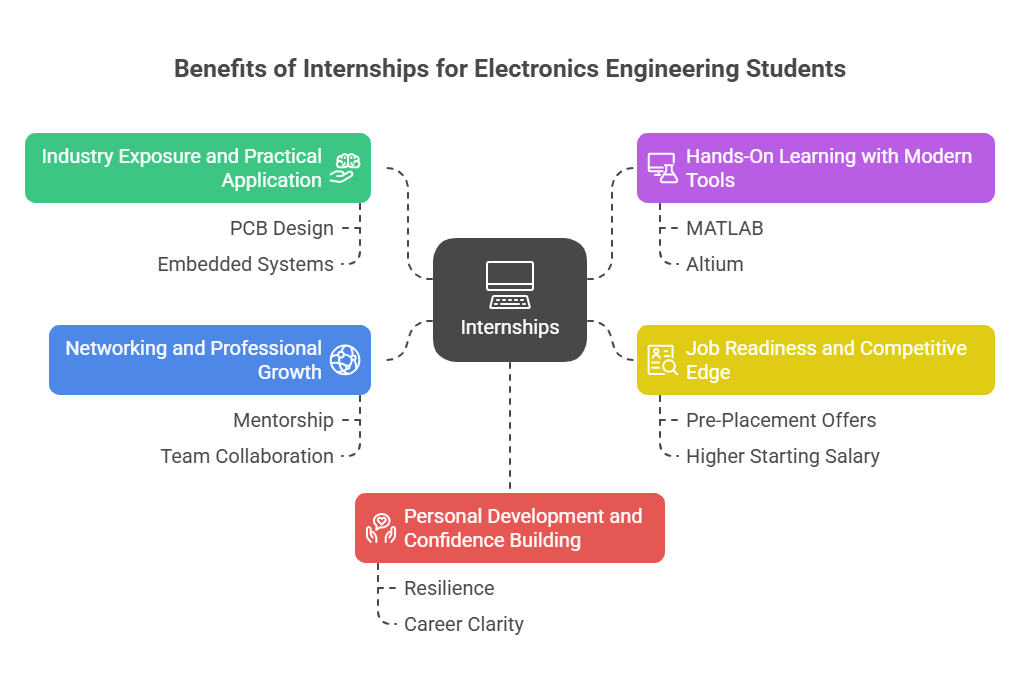Table of Contents
Internships are a vital part of any Electronics Engineering student’s academic journey, serving as the bridge between theoretical classroom knowledge and practical real-world application. Recognizing the importance of these experiences, Kerala Technological University (KTU) mandates internships as a part of the curriculum to ensure students gain hands-on skills relevant to their future careers.
In this comprehensive guide, we focus on the KTU internship requirements for Electronics Engineering students, with a special emphasis on embedded systems, the core area of electronics that integrates software and hardware for real-time control solutions. Additionally, we will explore how you can fulfill your internship requirements efficiently and how Entri’s embedded systems course, along with recommended supplementary courses, can help you excel in your internship and beyond.
Key Takeaways:
- KTU requires Electronics Engineering students to complete a 4-6 week internship after six semesters.
- The Embedded Systems domain is highly valued and provides broad, practical experience applicable to many industries.
- Entri’s Embedded Systems course empowers students with hands-on skills in microcontrollers, IoT, and real-time control.
- Internship registration, approval, active participation, daily documentation, and post-internship report submission are mandatory KTU steps.
- Early preparation, active communication, and a professional attitude maximize the internship’s benefits.
Why Does KTU Mandate an Internship?
Duration & Credit Points
Kerala Technological University (KTU) mandates a 4–8 week internship for all B.Tech students across specializations including Electronics Engineering. This internship gives students up to 20 activity points toward their graduation requirements.
Eligibility & Timing
Allowed typically post-semester 6 (i.e., 7th or 8th semester). Students must clear their academic backlogs and adhere to the CGPA requirements set by their department.
Documentation & Evaluation
KTU requires:
-
Internships must be approved in advance by the department and logged in KTU’s academic system.
-
A standardized internship report and a reflective journal are mandatory.
-
Students undergo an internship defense and get evaluated by both the host organisation and an academic supervisor.
Kickstart your embedded systems career and turn your tech passion into high-demand skills!
Master Embedded Systems Programming!
Launch your tech career with our Embedded Systems Course in Kerala, designed for hands-on learning and industry readiness.
Know MoreWhat Common Challenges Do ECE Students Face?
-
Industry access constraints: Many electronics engineering students in Kerala face difficulty securing internships at reputable firms.
-
Logistical & paperwork hurdles: Coordinating schedules, obtaining approvals, and completing official documentation can be complex.
-
Credit uncertainty: Some internships may not align well with KTU documentation rules, risking loss of points.
Core Guidelines for a KTU-Approved Internship
-
Alignment with Curriculum: The internship must allow you to apply electronics engineering theories in practical settings, like site supervision, project management, system design, or testing and commissioning.
-
Approved Providers: Host organizations can include energy utilities, construction and MEP companies, electronics consultancy firms, or R&D labs.
-
Certification: Upon completion, students must secure a valid certification from the internship provider. This certificate becomes part of your academic record and can boost your employability.
KTU Internship Eligibility Criteria for Electronics Engineering Students
Before proceeding with your internship, you must ensure you meet the following KTU criteria:
Master Embedded Systems Programming!
Launch your tech career with our Embedded Systems Course in Kerala, designed for hands-on learning and industry readiness.
Know Morea. Academic Requirements
-
Completion of a minimum of six semesters in the B.Tech Electronics Engineering program.
-
A minimum CGPA of 6.0 or higher (check with your department for any elevated criteria).
b. No Backlogs
-
All previously failed or backlog subjects must be cleared before undertaking internships.
These requirements ensure that students are academically prepared to take on real-world technical challenges during their internships.
The Central Role of Embedded Systems in Electronics Engineering Internships
Among different fields within Electronics Engineering, embedded systems stand out as the backbone of current technological innovation. An embedded system combines hardware and software to perform dedicated functions and is found in smartphones, appliances, vehicles, medical devices, and IoT applications.
Why Focus on Embedded Systems?
-
Embeds real-time computing devices into everyday electronics, making this domain highly sought after.
-
Provides extensive opportunities ranging from microcontroller programming, firmware development, IoT device creation to hardware interfacing, skills highly valued by employers.
-
Offers diverse project work during internships, from developing smart sensors to writing control algorithms for robotics.
Entri’s Embedded Systems course is tailored specifically for electronics students to gain practical, market-aligned skills. The course provides hands-on projects with industry-standard platforms like Arduino and Raspberry Pi, introducing you to microcontrollers, IoT applications, hardware-software integration, and real-time system debugging.
Advantages of Choosing Embedded Systems for an Internship
-
You gain expertise in designing, analyzing, and implementing real-world systems.
-
You learn vital practical skills that make you job-ready for sectors like automation, robotics, automotive electronics, and smart devices.
-
Embedded systems knowledge forms a solid foundation that complements other electronics disciplines.
Other Recommended Skilling Courses to Supplement Your Internship
While embedded systems are the primary focus, supplementing your skills with multidisciplinary knowledge improves versatility:
a. MEP (Mechanical, Electrical, and Plumbing) Engineering
-
Useful if you are interested in large-scale electronics integrated with mechanical and electrical systems.
-
Relevant to smart building automation, HVAC control systems, and industrial installations.
b. MEP QS (Quantity Surveying)
-
Concentrates on cost estimation and management of mechanical, electrical, and plumbing projects.
-
Vital for managing budgets in large electronics and IoT infrastructure deployments.
c. BIM (Building Information Modeling):
Learn how electrical engineers contribute to integrated 3D design, collision detection, and collaborative construction processes.
d. Quantity Surveying (QS):
Broaden your capabilities in cost estimation and contract management for entire projects, not just the Electronics portions.
e. Structural Design:
Helpful for understanding how MEP and Electronics systems integrate with structural and architectural elements, critical for project coordination.
These courses round out your technical skills, helping you tackle intern projects holistically while making you stand out to recruiters.
Kickstart your embedded systems career and turn your tech passion into high-demand skills!
KTU Internship Process for Electronics Engineering Students
To fulfill the internship requirement under KTU, students must follow these steps:
1: Internship Registration
-
Register your internship intent with the Electronics department.
-
Submit relevant documents: resume, faculty recommendation, and internship approval letter from the host company or research lab.
2: Internship Approval
-
Ensure your internship aligns with course objectives and offers valuable experience in electronics or embedded systems.
-
Department faculty will review and approve your application.
3: Internship Duration
-
The standard period is 4 to 6 weeks.
-
Some internships may extend longer with faculty and company agreement.
4: Actively Participate
-
Fully engage in assigned projects and tasks.
-
Maintain a daily log tracking your activities and lessons learned.
-
Regularly update your faculty supervisor.
5: Submission of Documentation
-
Prepare a detailed internship report explaining your contributions, outcomes, and skills gained.
-
Submit an evaluation from your host organization.
-
Obtain a final review by your faculty supervisor.
How Entri’s Embedded Systems Course Can Boost Your Internship Experience
Entri’s Embedded Systems course is designed to equip Electronics Engineering students with the practical skills required for impactful internships:
-
Hands-on Projects: Work on Arduino and Raspberry Pi based real-world projects, building firmware and hardware integration capabilities.
-
Industry-Relevant Skills: Learn sensor interfacing, IoT communication protocols, embedded software debugging, and real-time system programming.
-
Flexible Learning: Online modules allow you to learn at your own pace, perfect alongside your academic schedule.
Completing this course improves your confidence to solve complex embedded challenges during internships and enhances your resume to future employers.
Why Internships Are a Must for Electronics Engineering Students
Internships are more than a curriculum requirement, they’re a ticket to career success in electronics engineering, a field that’s going to boom in India with semiconductors and 5G/6G.
Industry Exposure and Practical Application
KTU ECE students study digital circuits, microprocessors, and communication systems in sem 1-6. Internships apply this knowledge in the real world, designing PCBs at a tech company or troubleshooting embedded systems in IoT projects. This hands-on experience makes concepts like signal modulation or FPGA programming clear and prepares you for roles at Bosch or Qualcomm.
Hands-On Learning with Modern Tools
Internships introduce tools like MATLAB for simulations, Altium for PCB design or Arduino for prototyping—essential in 2025. KTU’s syllabus is VLSI and embedded systems heavy, and internships give you access to industry-standard labs and help you develop skills in areas like RF engineering or automation.
Job Readiness and Competitive Edge
With India’s electronics market growing, internships often lead to pre-placement offers. Students with experience get 15-25% higher starting salary (around 4-6 LPA) and stand out in placements. They gain expertise in areas like AI-integrated electronics.
Networking and Professional Growth
Connect with mentors at SMEClabs or through IEEE events. Develop soft skills like debugging under deadlines or team collaboration on circuit designs.
Personal Development and Confidence Building
Overcoming challenges like optimizing a wireless sensor network builds resilience and clarifies career paths in VLSI, telecom, or robotics.
Internships make KTU ECE students employable innovators.
Tips to Secure and Excel in Your Internship
-
Apply Early: Start applying for internships at least 2-3 months in advance.
-
Customize Your Resume: Highlight your embedded systems projects and relevant coursework.
-
Network: Use faculty contacts, alumni, and LinkedIn to find quality internship opportunities.
-
Show Enthusiasm: Demonstrate eagerness to learn and contribute during interviews and your internship.
-
Document Work: Keep detailed notes and results, which simplify final report writing.
Watch the content in video format:
Conclusion
Internships are a fundamental part of your journey as an Electronics Engineering student at KTU, serving as the launchpad for your career. Focusing on embedded systems during your internship not only aligns with industry demand but also strengthens your core competencies in this fast-changing technical world.
By coupling your practical internship experience with Entri’s focused courses, you position yourself for success, not just in fulfilling university requirements but in becoming a confident, capable engineer ready to take on complex electronics challenges. Start building these skills today to make your internship a transformative experience on your path to a rewarding electronics engineering career.
Master Embedded Systems Programming!
Launch your tech career with our Embedded Systems Course in Kerala, designed for hands-on learning and industry readiness.
Know MoreFrequently Asked Questions
When do Electronics Engineering students typically undertake their internships at KTU?
Internships are usually completed after the 6th semester.
What kinds of internships are available for Electronics Engineering students under KTU?
Students can choose between industrial internships focused on practical electronics work or research internships at reputed institutes.
Why is embedded systems emphasized in Electronics Engineering internships?
Embedded systems combine hardware and software skills vital for modern electronics applications and industry demand.
How long should the KTU internship last?
The internship should be between 4 to 6 weeks, but longer durations can be discussed.
What is the process to get internship approval through KTU?
You must register with the department, submit relevant documents, secure company confirmation, and get official departmental approval.
How does Entri’s Embedded Systems course help Electronics Engineering students?
It provides hands-on skills in microcontroller programming, IoT application development, and hardware interfacing to enhance internship performance and job readiness.
What documentation is required after completing the internship?
Students must submit an internship report, a performance evaluation from the host organization, and receive faculty review.
How can students secure the best Electronics Engineering internships?
Start early, leverage college and faculty resources, prepare a strong resume focusing on embedded projects, and maintain professionalism throughout



















